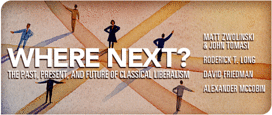Based on Z&T’s first article it seems as though there are five potential criteria for moral justification of an economic system other than one based strictly on deontic rights protection:
1. The system delivers the greatest payout to most well-off in society.
2. The system delivers the greatest payout to the average members in society
3. The system delivers the greatest payout to the least well-off in society
4. The system delivers the greatest payout to everyone in society (i.e. including the least, average, and most well-off) …”
I do not know what either #2 or #4 is supposed to mean.
In #2, does “average members” mean “median members”? If so, neither I nor anybody else I have ever heard of advocates that criterion. If, on the other hand, what it means is “the greatest payout, averaged over all members of society,” then it corresponds to one version of utilitarianism (assuming “payout” means “utility”), but his later claim that #2 is consistent with “the moral justification of free market institutions is logically independent from any claims about the effects of those institutions on the material holdings of the poor” is false, since the poor go into the average along with everyone else.
Does #4 mean “every single person in the society is better under the system than under any other system?” If so, it is unlikely that any system would satisfy it. The only other sense I can make of it is that it means “the greatest payout averaged over everyone in the society,” in which case we are back with utilitarianism and the more reasonable interpretation of #2.
As far as I can tell, either two of his criteria are identical or one, at least, makes no sense and corresponds to nothing anyone here or elsewhere is arguing for.
Alexander goes on to write “David Friedman seems to be advocating #2 with his defense of utilitarianism.”
I am not defending utilitarianism, as ought to be obvious from my earlier post—if I were, I would have to hold that the society (or act or rule) that resulted in more utility was always better. I am arguing that, insofar as something beyond respect for rights ought to be included in the views of libertarians, that something looks more like utilitarianism than like social justice.
Like Alexander, I too “am interested in asking Z&T to clarify which of these standards they think is most appropriate for evaluating an economic system. Do they want to argue that we must give greater moral weight the least well-off or do they want to argue that we should treat everyone with equal moral weight, which includes the least-well off?” I asked earlier what “social” adds to “justice,” and I do not think I have yet gotten an answer.

